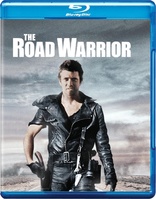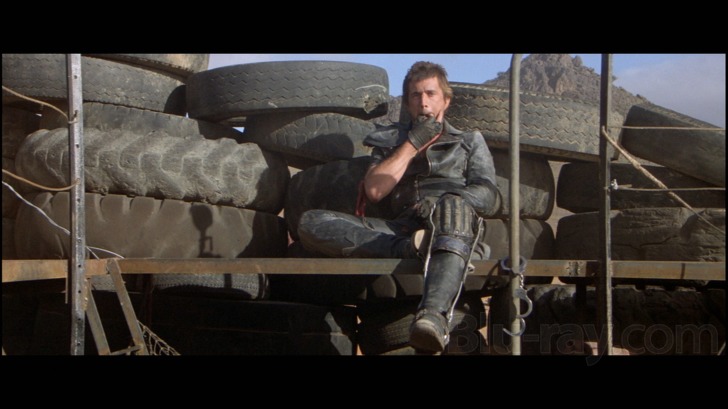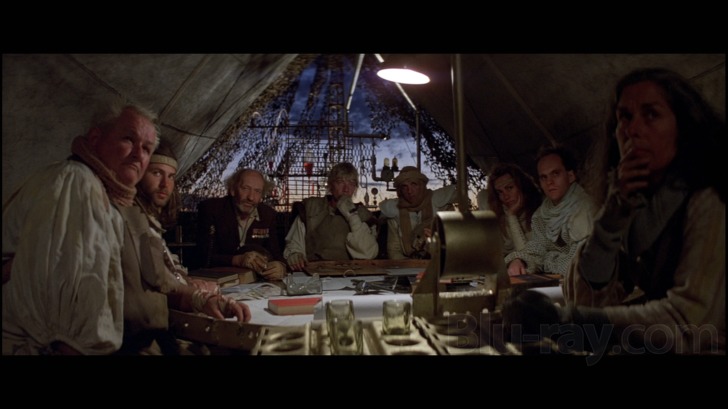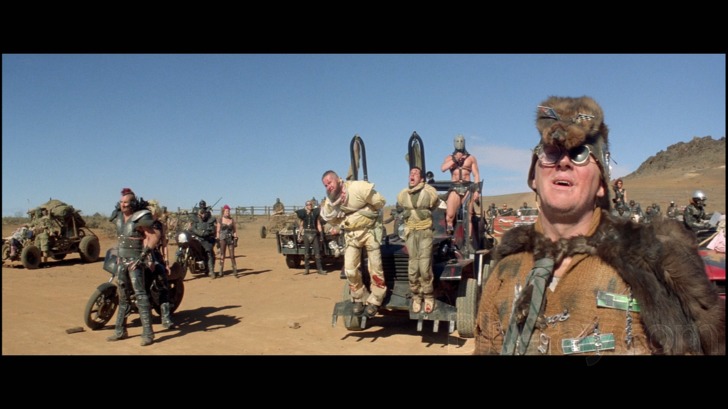The Road Warrior Blu-ray Movie
HomeThe Road Warrior Blu-ray Movie 
Mad Max 2Warner Bros. | 1981 | 95 min | Rated R | Jun 04, 2013

Movie rating
8.2 | / 10 |
Blu-ray rating
| Users | 3.9 | |
| Reviewer | 4.5 | |
| Overall | 3.9 |
Overview
The Road Warrior (1981)
In an apocalyptic future, Max helps a small band of survivors who are losing their struggle to protect an oil refinery under siege by a band of savage marauders.
Starring: Mel Gibson, Bruce Spence, Michael Preston, Max Phipps, Vernon WellsNarrator: Harold Baigent
Director: George Miller (II)
| Action | Uncertain |
| Thriller | Uncertain |
| Sci-Fi | Uncertain |
| Adventure | Uncertain |
Specifications
Video
Video codec: MPEG-4 AVC
Video resolution: 1080p
Aspect ratio: 2.39:1
Original aspect ratio: 2.39:1
Audio
English: DTS-HD Master Audio 5.1 (48kHz, 16-bit)
French: Dolby Digital 2.0
German: Dolby Digital 5.1 (640 kbps)
Italian: Dolby Digital 2.0
Spanish: Dolby Digital 5.1 (640 kbps)
Spanish: Dolby Digital 2.0
Portuguese: Dolby Digital Mono
Czech: Dolby Digital Mono
Hungarian: Dolby Digital Mono
Polish: Dolby Digital Mono
Russian: Dolby Digital 5.1
Japanese: Dolby Digital Mono
Subtitles
English SDH, French, German SDH, Italian SDH, Japanese, Portuguese, Spanish, Arabic, Croatian, Czech, Dutch, Finnish, Greek, Hebrew, Hungarian, Korean, Mandarin (Traditional), Norwegian, Polish, Romanian, Russian, Serbian, Slovenian, Swedish, Thai, Turkish
Discs
50GB Blu-ray Disc
Single disc (1 BD)
Playback
Region free
Review
Rating summary
| Movie | 5.0 | |
| Video | 4.0 | |
| Audio | 4.0 | |
| Extras | 2.0 | |
| Overall | 4.5 |
The Road Warrior Blu-ray Movie Review
Dystopia on Wheels
Reviewed by Michael Reuben June 2, 2013The Road Warrior (or Mad Max 2, as it is known outside the U.S.) is a cinematic landmark that quickly transcended its origins as an "Ozploitation" film to become a worldwide phenomenon. The film redefined how car chases could be photographed and edited, in the same way that Sergio Leone's spaghetti Westerns reconceived the choreography of gunfights. It brought co-writer and director George Miller to the attention of Steven Spielberg, thus spawning a career that gave us the Babe films and the Oscar-winning Happy Feet. It created a vision of the future that has been every bit as influential as Ridley Scott's in the following year's Blade Runner. And it made a bankable movie star out of its lead actor, Mel Gibson, whose career flourished for over thirty years before its recent collapse after repeated personal transgressions. The remarkable thing about so influential a film is how simple it is. Its story can be summed up in a sentence: Gasoline is scarce, and everyone wants to get their hands on a big supply. It could have been gold in the Old West or water in the desert. But by making gasoline the essential resource that everyone needs to survive, Miller and his co-writers, Terry Hayes and Brian Hannant, ingeniously transformed the thrill of speeding down the highway in the original Mad Max into a Darwinian fight for survival. In Road Warrior, the hero drives like a bat out of hell, because he has to stay ahead of the pursuers trying to steal the very "juice" that powers his vehicle. Speed and life are one and the same.

The film's opening narration—spoken by an elderly man (Harold Baigent) whose identity is not revealed until the film's end, and accompanied by a montage of black-and-white images centered in the widescreen frame—is a model of concise storytelling. With brevity and precision, it summarizes the key events of Mad Max and draws the broad outlines of the world as it now stands. Contrary to some accounts, it does not refer to a nuclear war, merely to a conflict between "two mighty warrior tribes" that exhausted their resources: "Without fuel, they were nothing." A short introductory chase introduces us to Max as he now exists, a loner behind the wheel, accompanied only by his dog (named, simply, "Dog"), and also to the mohawk-topped biker who will become his nemesis, Wez (Vernon Wells). But this encounter is mere prologue. After Max meets the Gyro Captain (Bruce Spence) in a manner befitting two outlaws, they stake out the makeshift refinery where a group of would-be colonists has barricaded themselves in an attempt to stockpile enough fuel to travel north and start a new life. A marauding pack of outlaws led by the Humungus (Swedish body builder Kjell Nilsson in a metal mask and prosthetic skull cap with thick, pulsing veins) assaults the compound day and night. Wez is his chief lieutenant. Max would like nothing better than to get in, get some gas and get out, but the situation isn't that simple. Every attempt he makes to barter with the colonists for fuel involves him more deeply in their predicament. When he offers to find them a rig to haul their tanker full of gasoline in exchange for "as much juice as I can carry", the plan puts him in the cross-hairs of the Humungus and Wez. Inevitably Max is forced to choose a side, which is just fine with the colonists' leader, Pappagallo (Mike Preston), who has been losing his grip on the situation and needs all the skilled help he can get. Max's presence is even more welcome to the youngster identified only as the Feral Kid (Emil Minty), a wild child who speaks not a one word of dialogue but has expressive eyes, terrific survival skills and a mean aim with a boomerang. In Max he immediately senses a kindred spirit. The climactic chase sequence with Max at the wheel of the tanker truck has never been exceeded for its kinetic intensity, probably because no crew since then has been willing (or allowed) to risk injury in the way that Miller's company did on a daily basis. No one was killed, but at least one stuntman was badly hurt. The result on the screen is a high-speed assault that didn't have to be tricked out in the editing room to feel dangerous, because it really was. (When I first saw it in the theater in 1982, the audience literally screamed.) To Miller's great credit as both director and writer, he is able to bring this signature sequence to a satisfying conclusion that also serves the story, and he's smart enough not to extend the film one second longer than necessary beyond that point. When the chase is over, so is The Road Warrior.
The Road Warrior Blu-ray Movie, Video Quality 

Warner Home Video previously released The Road Warrior on Blu-ray in 2007. J.C. Ribera's review of that edition can be found here. The key point of discussion was a change in color timing from previous home video versions toward the cooler end of the spectrum. Initial speculation suggested that this new 2013 remaster might have reverted to the earlier color timing, but in direct comparison to the 2007 Blu-ray, it's evident that this is the same transfer with identical colors. (For an example, see screenshots 10 and 11; the shot from 2007 is labeled as such.) What Warner has done for this Blu-ray edition is re-author the disc with the AVC codec, which has replaced VC-1 as its preferred compression scheme, include lossless audio and a larger selection of alternate language and subtitle tracks, and place the result on a BD-50 instead of a BD-25 (although it should be noted that only 23.7 Gb of the disc's capacity has been used). The average bitrate is now 25.63 Mbps, as compared to 21.94 on the previous disc. Both discs, of course, are 1080p. The result of the remastering visually is a slight (very slight) improvement in fine detail, which was already quite good on the 2007 disc. Owners of large front-projection systems are those most likely to benefit from the improvement; anyone with a direct-view TV will have to look hard to spot the difference. As Mr. Ribera noted in his review of the earlier disc, there are portions of Road Warrior that will never look spectacular. In the Blu-ray commentary, cinematographer Dean Semler comments on the limitations of the era's film stocks, describes "pushing" the film in the lab and notes his tendency to underlight for fear of overexposure. Some of the grainiest night scenes, especially when the blacks shade to gray, result from these issues, which today would have been fixed on a digital intermediate. But these are artifacts of the age in which Road Warrior was made, and as Semler and Miller laughingly note, filmmakers in that era had to work close and "get dirty". The very conditions that created these analog artifacts are inseparable from the working conditions that made Road Warrior what it is. So, as far as image is concerned, this new edition of Road Warrior offers marginal improvements that will loom larger as the image is expanded for display. It's in the sonic arena that the real benefits lie.
The Road Warrior Blu-ray Movie, Audio Quality 

The Road Warrior was the first Australian film mixed with a Dolby stereo soundtrack, and it was reportedly also released in a 70mm blow-up with a 6-track mix. Whatever source was used, the film has had a 5.1 soundtrack on home video since its first DVD release in 1997. The earlier Blu-ray offered that soundtrack in Dolby Digital 5.1, but this new edition has lossless DTS-HD MA 5.1, and it is impressive. The roar of engines has a real bottom end to it now. So does Brian May's unforgettable score, which is essential to a soundtrack that goes for long stretches without dialogue. Lossless treatment cannot add more refinement to the orchestra's mid-section than is already there in the original recording, but the top end never sounds brittle or fatiguing. The rear channels are not used for major effects, because the sound design didn't envision discrete rear channel effects, but they help broaden the front sound stage, enlarging the sense of space. The spare dialogue, which frequently has to compete with many other sounds, is clearer and more distinct than I have ever heard it before. This is the first version of Road Warrior in which I could understand the Gyro Captain's every word. I could also make out more of Pappagallo's speech off-camera when he is addressing the colonists, while Max is getting acquainted with the Feral Kid. Although I have not done an A/B comparison, I suspect that Warner didn't just re-encode the mix, but they also may have "sweetened" it as well. Whatever they did, the result is the best-sounding version of Road Warrior I have ever heard.
The Road Warrior Blu-ray Movie, Special Features and Extras 

The extras are identical to those on the 2007 Blu-ray. Some people may notice that I have rated them a little higher than Mr. Ribera, which is simply a difference of opinion. While I would have preferred new extras, I think the commentary by Miller and Semler is among the better ones I have encountered.
- Introduction by Leonard Maltin (480i; 1:33:1; 3:37): Playable as either a separate item or, optionally, before the film starts, this brief intro by the well-known film critic introduces Road Warrior to anyone not familiar with its place in film history.
- Commentary with Directory George Miller and Cinematographer Dean Semler: Semler, an Oscar winner for Dances with Wolves (1990) and a recent winner of the Lifetime Achievement Award from the American Society of Cinematographers, reunites with Miller to reminisce about making their first film together. Both were relative newcomers to feature films, and much of what they were doing had rarely been done. Of particular interest in their account is how much they had to depend on instinct to know whether they'd gotten a particular shot, because they were working without instant playback or video assist.
- Theatrical Trailer (480i; 1.78:1, enhanced; 2:31): Since Gibson was still an unknown, the trailer focused on action.
The Road Warrior Blu-ray Movie, Overall Score and Recommendation 

It could fairly be argued that Warner has now provided us with the Blu-ray of Road Warrior that it should have released in the first place. After a six-year wait, no one should be surprised if fans are disappointed that lossless audio is the only real improvement on offer. For such an important and influential film, were there really no new extras available? Wasn't it worth the investment in producing any? For those who already own the 2007 Blu-ray, and are not interested in acquiring the Mad Max Trilogy metal box, I don't see any reason to rush out and acquire the remaster. The improvements just aren't that significant. But for anyone who doesn't already own a copy of Road Warrior, this is hands-down the version to acquire. And if you don't own a copy of Road Warrior, you should. Highly recommended.
Other editions
Mad Max 2: The Road Warrior: Other Editions

The Road Warrior
Mad Max 2
1981

The Road Warrior
Mad Max 2
1981

The Road Warrior
Mad Max 2
1981

The Road Warrior
Mad Max 2
1981

The Road Warrior
Mad Max 2
1981

Mad Max: The Road Warrior 4K
wrong audio tracks
1981

Mad Max: The Road Warrior 4K
1981

Mad Max: The Road Warrior 4K
Corrected Disc / Mad Max 2
1981
Similar titles
Similar titles you might also like

Mad Max Beyond Thunderdome
1985

Mad Max 4K
1979

Mad Max: Fury Road 4K
2015

Tenet 4K
2020

Maze Runner: The Scorch Trials
2015

Terminator Salvation
Director's Cut
2009

Riddick 4K
2013

The Book of Eli
2010

2012 4K
2009

Terminator 2: Judgment Day 4K
+BD with the 3 versions
1991

Resident Evil: Extinction
2007

Resident Evil: Apocalypse
2004

Doomsday 4K
2008

Pitch Black 4K
Special Edition
2000

The Colony
2013

Furiosa: A Mad Max Saga 4K
2024

Skyline
2010

World War Z
2013

Total Recall
Extended Director's Cut
2012

Terminator Genisys 4K
2015